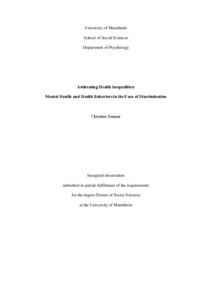|
Addressing health inequalities: mental health and health behaviors in the face of discrimination
Emmer, Christine
![[img]](https://madoc.bib.uni-mannheim.de/68256/1.hassmallThumbnailVersion/Dissertation%20Christine%20Emmer.pdf)  Vorschau |
|
PDF
Dissertation Christine Emmer.pdf
- Veröffentlichte Version
Download (3MB)
|
|
URN:
|
urn:nbn:de:bsz:180-madoc-682567
|
|
Dokumenttyp:
|
Dissertation
|
|
Erscheinungsjahr:
|
2024
|
|
Ort der Veröffentlichung:
|
Mannheim
|
|
Hochschule:
|
Universität Mannheim
|
|
Gutachter:
|
Sonnentag, Sabine
|
|
Datum der mündl. Prüfung:
|
12 November 2024
|
|
Sprache der Veröffentlichung:
|
Englisch
|
|
Einrichtung:
|
Fakultät für Sozialwissenschaften > Gesundheitspsychologie (Mata 2015-)
|
|
Fachgebiet:
|
150 Psychologie
|
|
Freie Schlagwörter (Englisch):
|
health psychology , social inequality , discrimination , health , well-being , health behavior , physical activity , nutrition, sleep , substance use
|
|
Abstract:
|
Social inequality is a major challenge for public health, leading to mental health inequalities through discrimination as one pathway. However, there has been a lack of clear causal evidence demonstrating the adverse mental health effects of discrimination, with existing research primarily focusing on observational cross-sectional analyses. Additionally, potential modifiable mechanisms and protective factors have remained largely unclear. To address these research gaps, I examined the effects of discrimination on mental health through different methodological approaches enhancing causal inference and capturing varying temporal resolutions, including immediate direct effects, daily dynamics, and long-term consequences. This dissertation emphasizes health behaviors as both mediators and moderators of the effects of discrimination on mental health, highlighting health behaviors as crucial yet overlooked levers to reduce mental health inequalities.
In Manuscript 1, I investigated the causal effects of discrimination on mental health through a systematic meta-analysis of experimental studies and provided a comprehensive review of theories and mechanisms. The meta-analysis included 245 effect sizes from 73 studies with 12,097 participants. The results confirmed that experimentally induced discrimination immediately led to poorer mental health outcomes. Gender and age did not moderate the effect, potentially due to the predominant use of convenience samples (mostly female university students). Group status–whether participants possess marginalized or non-marginalized identities targeted by discrimination, such as identifying as female versus male in a manipulation of sexism–showed a trend toward stronger effects for marginalized identities. Discrimination manipulated to be pervasive across time and contexts showed stronger mental health effects than isolated single events. To advance future research, I further developed a first taxonomy of experimental research paradigms. Overall, through this study, I was able to: a) provide a systematic meta-review of relevant theories and mechanisms explaining the adverse effects of discrimination on mental health, b) clearly demonstrate its immediate direct and causal effects, c) highlight important moderators, d) specify the first taxonomy of experimental paradigms to induce discrimination, and e) identify gaps in current experimental discrimination research, primarily involving selective samples of young women with higher education from the US.
In Manuscript 2, I examined the long-term effects of perceived discrimination on mental health and health behaviors as mediators by utilizing a research design with greater ecological validity than experimental studies. I analyzed data from 9,957 adolescents (Mage = 14.90) from the CILS4EU multinational panel (a longitudinal survey in four European countries) with three annual assessments. This study targeted adolescents as a particularly vulnerable but often overlooked population group in health and discrimination research and focused on well-being as a key aspect of mental health. Perceived discrimination predicted decreased well-being two years later as well as decreased protective health behaviors (physical activity, nutrition, and sleep) and increased risky health behaviors (substance use) one year later. Nutrition and sleep mediated the relationship between perceived discrimination and well-being, while no mediation was found for physical activity and substance use. This study demonstrates that a) discrimination begins early in life, b) its detrimental long-term effects on mental health are visible even in observational data with two-year time intervals, and c) these effects are partially mediated through changes in health behaviors.
Protective health behaviors can help reduce the impact of psychosocial stressors. However, discrimination can negatively affect these health behaviors, worsening its overall impact on mental health. In Manuscript 3, I examined physical activity as a protective factor against migration-specific acculturative stressors, including experiences of discrimination, work challenges, language barriers, intercultural relations, and cultural isolation. I focused on their daily associations with well-being (positive and negative affect) and cultural identity (ethnic and national identity) and tested physical activity as a moderator. Results of a daily diary study with 266 participants (1,473 observations) demonstrated that acculturative stress was associated with lower well-being and national disidentification but not ethnic identification. In additional analyses, experiences of discrimination emerged as the strongest predictor compared to the other stressors. Physical activity was linked to higher well-being amidst acculturative stress and showed a statistically non-significant tendency to buffer its association with negative, but not positive affect. Being physically active was not associated with cultural identity. Exploratory analyses indicated that stronger national and ethnic identity correlated with higher well-being and exacerbated the relation of acculturative stress with well-being. Overall, results demonstrate that a) individuals with a migration background face daily acculturative stressors that might adversely affect their well-being and cultural identity, b) physical activity appears to be a promising tool to strengthen well-being amidst discrimination and further minority stressors in day-to-day life, and c) social identity can be a vulnerability factor enhancing effects of discrimination on mental health.
In sum, this dissertation establishes discrimination is a significant stressor for minority groups. Employing a multimethodological approach, I demonstrate its adverse mental health effects immediately in laboratory settings, daily in a field setting, and over two years in a panel study. This research revealed that discrimination influences both risky and protective health behaviors, which can mediate the mental health effects of discrimination. Additionally, by focusing on physical activity within migrant populations—a group notably underrepresented in psychological research––this work illustrated that health behaviors can also act as moderators in the context of discrimination, highlighting their vital importance for vulnerable groups and reducing mental health inequalities.
|
 
 | Dieser Eintrag ist Teil der Universitätsbibliographie. |
 | Das Dokument wird vom Publikationsserver der Universitätsbibliothek Mannheim bereitgestellt. |
 Suche Autoren in Suche Autoren in
Sie haben einen Fehler gefunden? Teilen Sie uns Ihren Korrekturwunsch bitte hier mit: E-Mail
Actions (login required)
 |
Eintrag anzeigen |
|
